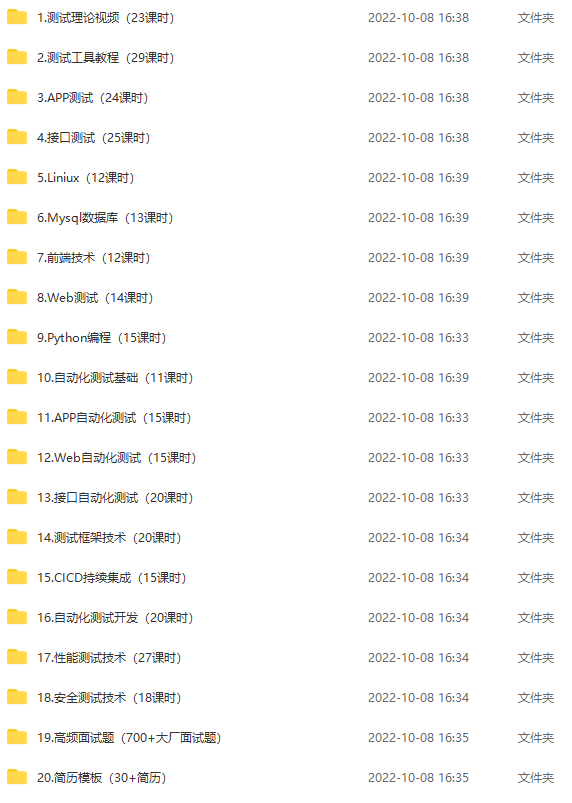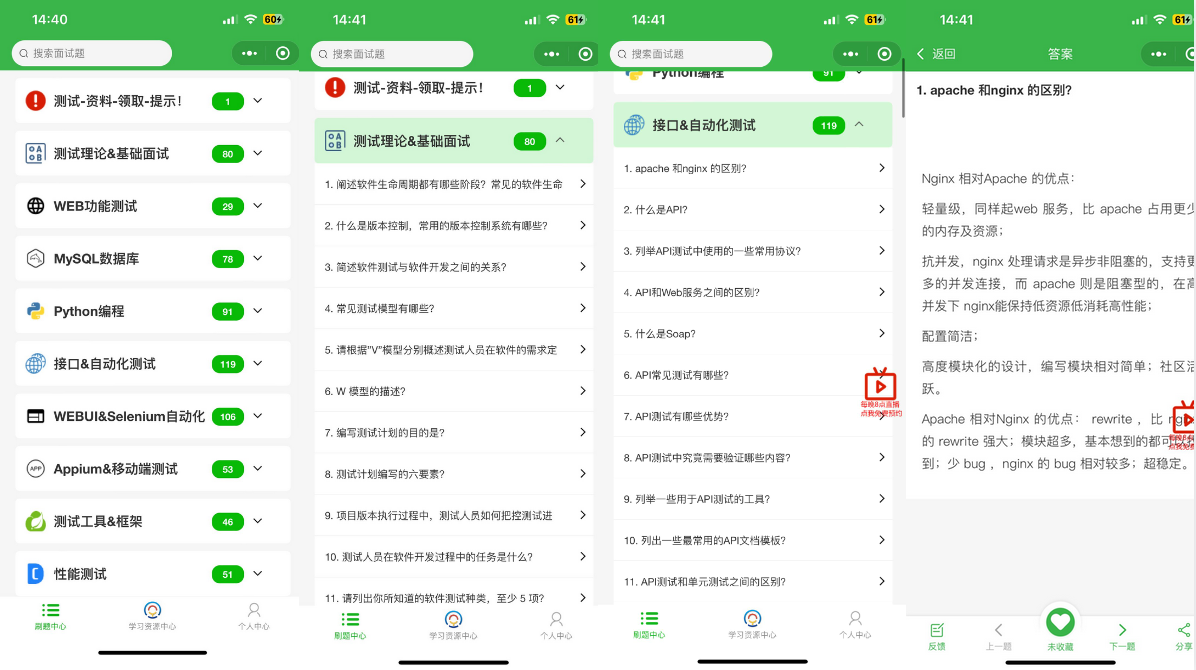
Pytest框架 —— setUp()和tearDown()函数
1、setUp()和tearDown()函数介绍,之前学过Unittest测试框架,知道前置setup()函数和后置teardown()函数非常好用,在每次用例开始前和结束后都去执行一次。当然还有更高级一点的setupClass()函数和teardownClass()函数,需配合classmethod装器一起使用,在做Selenium自动化的时候,它的效率尤为突出,可以只启动一次浏览器执行多个用例

1、setUp()和tearDown()函数介绍
之前学过Unittest测试框架,知道前置setup()函数和后置teardown()函数非常好用,在每次用例开始前和结束后都去执行一次。
当然还有更高级一点的setupClass()函数和teardownClass()函数,需配合classmethod装饰器一起使用,在做Selenium自动化的时候,它的效率尤为突出,可以只启动一次浏览器执行多个用例。
2、setUp()和tearDown()函数作用
总结:setup()函数表示测试类中每个测试方法执行前都需要执行的操作,teardown()函数表示每个测试方法执行后都需要执行的操作。
3、Pytest框架的setUp()和tearDown()
Pytest框架也有前置setup()函数和后置teardown()函数,并且还不止四个。
Pytest框架setUp()函数和tearDown()函数主要分为:模块级,类级,方法级,函数级。
说明每个级别的含义:
模块级:指的是一个
.py文件。类级:一个
.py文件中可以写多个类。(一般情况下只写一个类)方法级:类中定义的方法叫方法。
函数级:类外定义的方法叫函数。
Pytest框架提供的setUp()函数和tearDown()函数如下:
模块级与函数级,不定义在测试类中。
- 模块级:
setup_module()/teardown_module():开始于模块始末,全局的。 - 函数级:
setup_function()/teardown_function():只对函数用例生效(不在类中)。
类级与方法级,定义在类中
-
类级:
setup_class()/teardown_class():只在类中前后运行一次(在类中)。 -
方法级:
setup_method()/teardown_method():开始于方法始末(在类中)。 -
自由的:
setup()/teardown():直接使用感觉和方法级前后置函数一样。
4、示例
(1)方法级
"""
setup_method()和 teardown_method()函数
需要定义在测试类中,定义在类外不起作用。
setup_method()定义场景,如:打开浏览器,加载网页等
teardown_method()场景,如:关闭浏览器等
"""
import pytest
# 测试类
class Test_setUp_tearDown:
# 方法级,前置函数
def setup_method(self):
print("setup_method(self):在每个测试方法之前执行")
# 方法级,后置函数
def teardown_method(self):
print("teardown_method(self):在每个测试方法之后执行\n")
# 测试用例a
def test_a(self):
print("test_a方法")
assert True
# 测试用例b
def test_b(self):
print("test_b方法")
assert True
if __name__ == '__main__':
pytest.main()
"""
执行结果:
setup_method(self):在每个测试方法之前执行
test_a方法
teardown_method(self):在每个测试方法之后执行
PASSEDsetup_method(self):在每个测试方法之前执行
test_b方法
teardown_method(self):在每个测试方法之后执行
"""
(2)类级
"""
setup_class()和 teardown_class()函数
需要定义在测试类中,定义在类外不起作用。
setup_class()定义场景,比如:创建日志对象,创建数据库的连接,创建接口的请求对象等。
teardown_class()定义场景,比如:销毁日志对象,销毁数据库的连接,销毁接口的请求对象。
"""
import pytest
class Test_setUp_tearDown:
# 方法级,前置函数
def setup_method(self):
print("setup_method(self):在每个测试方法之前执行")
# 方法级,后置函数
def teardown_method(self):
print("teardown_method(self):在每个测试方法之后执行\n")
# 类级,前置函数
def setup_class(self):
print("setup_class(self):每个测试类之前执行一次\n")
# 类级,后置函数
def teardown_class(self):
print("teardown_class(self):每个测试类之后执行一次")
# 测试用例a
def test_a(self):
print("test_a方法")
assert True
# 测试用例b
def test_b(self):
print("test_b方法")
assert True
if __name__ == '__main__':
pytest.main()
"""
执行结果:
setup_class(self):每个测试类之前执行一次
setup_method(self):在每个测试方法之前执行
test_a方法
teardown_method(self):在每个测试方法之后执行
PASSEDsetup_method(self):在每个测试方法之前执行
test_b方法
teardown_method(self):在每个测试方法之后执行
teardown_class(self):每个测试类之后执行一次
"""
(3)函数级
"""
setup_function()和 teardown_function()函数
需要定义在测试类外面,只负责函数的前后置。
对类中定义的方法,不起作用。
"""
import pytest
# 函数级,前置函数
def setup_function():
print("setup_function: 每个函数开始前都会执行")
# 函数级,后置函数
def teardown_function():
print("teardown_function: 每个函数结束都会执行\n")
# 测试用例a
def test_a():
print("test_a函数")
assert True
# 测试用例b
def test_b():
print("test_b函数")
assert True
# 测试类
class Test_setUp_tearDown:
# 测试用例a
def test_c(self):
print("test_c方法")
assert True
# 测试用例b
def test_d(self):
print("test_d方法")
assert True
if __name__ == '__main__':
pytest.main()
"""
执行结果:
setup_function: 每个函数开始前都会执行
test_a函数
teardown_function: 每个函数结束都会执行
PASSEDsetup_function: 每个函数开始前都会执行
test_b函数
teardown_function: 每个函数结束都会执行
PASSEDtest_c方法
PASSEDtest_d方法
PASSED
"""
(4)模块级
"""
setup_module()和 teardown_module()函数
需要定义在测试类外面,
对函数和类中定义的方法,都不起作用。
"""
import pytest
# 模块级,前置函数
def setup_module():
print("setup_module():在模块最之前执行\n")
# 模块级,后置函数
def teardown_module():
print("teardown_module:在模块之后执行")
# 函数级,前置函数
def setup_function():
print("setup_function: 每个函数开始前都会执行")
# 函数级,后置函数
def teardown_function():
print("teardown_function: 每个函数结束都会执行\n")
# 测试用例a
def test_a():
print("test_a函数")
assert True
# 测试用例b
def test_b():
print("test_b函数")
assert True
# 测试类
class Test_setUp_tearDown:
# 测试用例a
def test_c(self):
print("test_c方法")
assert True
# 测试用例b
def test_d(self):
print("test_d方法")
assert True
if __name__ == '__main__':
pytest.main()
"""
setup_module():在模块最之前执行
setup_function: 每个函数开始前都会执行
test_a函数
teardown_function: 每个函数结束都会执行
PASSEDsetup_function: 每个函数开始前都会执行
test_b函数
teardown_function: 每个函数结束都会执行
PASSEDtest_c方法
PASSEDtest_d方法
teardown_module:在模块之后执行
PASSED
"""
END绵薄之力
最后感谢每一个认真阅读我文章的人,看着粉丝一路的上涨和关注,礼尚往来总是要有的,虽然不是什么很值钱的东西,如果你用得到的话可以直接拿走:

这些资料,对于【软件测试】的朋友来说应该是最全面最完整的备战仓库,这个仓库也陪伴上万个测试工程师们走过最艰难的路程,希望也能帮助到你!
加入我的软件测试交流群:110685036免费获取~(同行大佬一起学术交流,每晚都有大佬直播分享技术知识点)软件测试面试小程序
被百万人刷爆的软件测试题库!!!谁用谁知道!!!全网最全面试刷题小程序,手机就可以刷题,地铁上公交上,卷起来!
涵盖以下这些面试题板块:
1、软件测试基础理论 ,2、web,app,接口功能测试 ,3、网络 ,4、数据库 ,5、linux
6、web,app,接口自动化 ,7、性能测试 ,8、编程基础,9、hr面试题 ,10、开放性测试题,11、安全测试,12、计算机基础

获取方式 :

更多推荐
 已为社区贡献9条内容
已为社区贡献9条内容










所有评论(0)